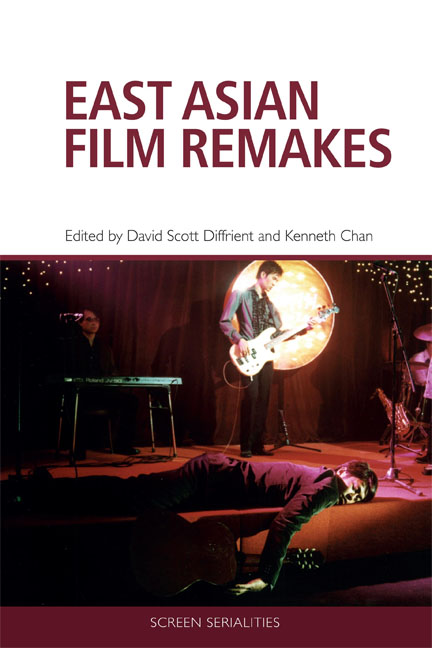Book contents
- Frontmatter
- Contents
- List of Illustrations
- Foreword
- Notes on Contributors
- Introduction: East Asian Film Remakes
- Part I Re-fleshing the Text: Sex, Seduction, Desire
- Part II Serialising Ozu: The Enduring Legacy of a Cinematic ‘Tofu Maker’
- Part III Revisiting Personal/Political Traumas in East Asian Action Films, Gangster Films and Westerns
- Part IV Local Flavours and Transcultural Flows in East Asian Comedies, Dramas and Fantasies
- Index
10 - Benny Chan’s Connected and the Hollywoodisation of Hong Kong Cinema
Published online by Cambridge University Press: 01 March 2025
- Frontmatter
- Contents
- List of Illustrations
- Foreword
- Notes on Contributors
- Introduction: East Asian Film Remakes
- Part I Re-fleshing the Text: Sex, Seduction, Desire
- Part II Serialising Ozu: The Enduring Legacy of a Cinematic ‘Tofu Maker’
- Part III Revisiting Personal/Political Traumas in East Asian Action Films, Gangster Films and Westerns
- Part IV Local Flavours and Transcultural Flows in East Asian Comedies, Dramas and Fantasies
- Index
Summary
Film scholarship has generally ignored the cinema of Hong Kong director Benny Chan Muk-sing (1961–2020). An avowed ‘commercial’ filmmaker, steeped in the traditions and trappings of popular genres, Chan could prima facie be dismissed as a slave to formula, beholden to the artistically suspect practices of filmic recycling and referentiality. His career encompasses sequels both legitimate (Gen-Y Cops [Te jing xin ren lei 2, 2000]) and nominal (A Moment of Romance II [Tian ruo you qing II: Tian chang di jiu, 1993]; New Police Story [Xin jing cha gu shi, 2004]). He braids his films with intertextual allusions and citations (for instance, The White Storm [Sou Duk, 2013] memorialises John Woo's heroic bloodshed sagas, and Call of Heroes [Ngai sing, 2016] pastiches Sergio Leone's Spaghetti Westerns). He plunders Johnnie To's All About Ah-Long (A lang de gu shi, 1989) in the male melodrama Son on the Run (Dai zi hong lang, 1991), while his historical drama Shaolin (Xin shao lin si, 2011) furnishes a loose reworking of the Shaw Brothers’ martial arts classic Shaolin Temple (Shao Lin si, 1982). There are, as well, numerous borrowings from Hollywood staples: Michael Mann's Heat (1995) in the crime thrillers Big Bullet (Chong feng dui nu huo jie tou, 1996) and Raging Fire (Nou fo, 2021), The Karate Kid (1984) in the sports comedy What a Hero! (Hua! Ying xiong, 1992) and a welter of Marvel superhero movies in the high-concept blockbuster City Under Siege (Chun sing gai bei, 2010). Not least, in Connected (Bo chi tung wah, 2008), there is that rare species of Hong Kong film: an authorised remake, co-produced by Hollywood, Hong Kong and Mainland Chinese companies, and modelled on David R. Ellis's American thriller Cellular (2004). In all, Chan's oeuvre might be seen to typify Hong Kong cinema's ‘scavenger aesthetic’ (Bordwell 2011, 7), so thoroughly does it rely on pre-existing source texts. For the critic attracted to filmic innovation and iconoclasm, Chan's cinema may seem too derivative, not to say too frankly profit-driven, to encourage scholarly attention.
- Type
- Chapter
- Information
- East Asian Film Remakes , pp. 200 - 220Publisher: Edinburgh University PressPrint publication year: 2023

